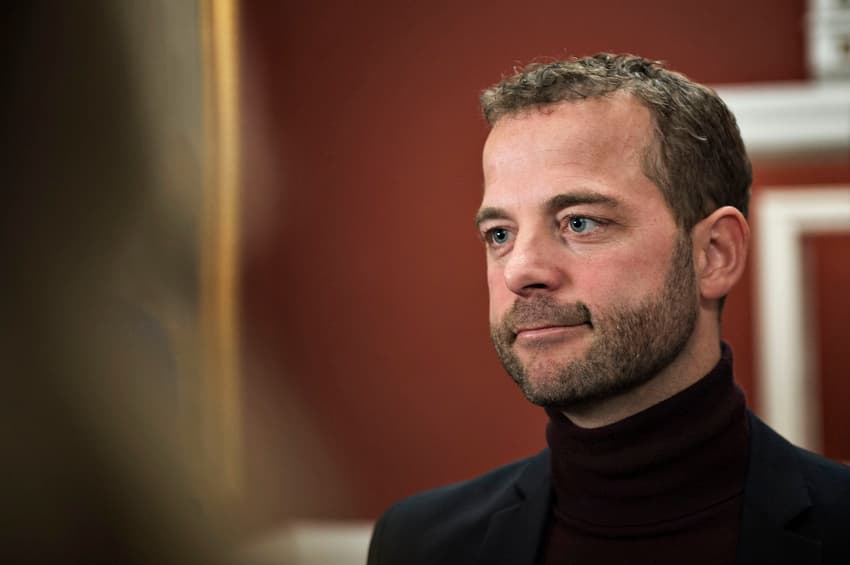Danish MP denies 'Nazi reference' after widespread criticism

Morten Østergaard, the leader of Denmark’s Social Liberal (Radikale Venstre) party, has denied a phrase he used to describe political opponents had deliberate connotations with Nazism.
In an interview with newspaper Børsen, Østergaard criticised Mette Frederiksen, leader of the Social Democrats and an erstwhile political ally, for announcing her party would not seek to govern in coalition with Østergaard’s Social Liberals.
The announcement by Frederiksen increases the possibility of closer collaboration between the Social Democrats and right-wing Danish People’s Party.
Østergaard described such a potential combination as a “red-brown cabinet”.
“A red-brown cabinet like this, with a Social Democratic government with the Socialist People’s Party [smaller left-wing party, ed.] and Danish People’s Party – would they be capable of strengthening society,” he said to Børsen.
The use of the expression “red-brown” was subsequently flagged as being associated with Nazism and the brown shirts worn by the original paramilitary wing of the Nazi Party.
Historians, as well as politicians from the Social Democrats, Socialist People’s Party, Danish Party and the Liberal party, the senior partner in the government, all criticised the wording used by Østergaard.
Socialist People’s Party leader Pia Olsen Dyhr wrote in a tweet that Østergaard was “desperate”, ostensibly in reference to the decision by her party and the Social Democrats to align themselves more closely to the Danish People’s Party.
Dyhr also wrote that she was “shocked and quite angry”, adding that the reference was “ahistorical”.
Er rystet og ganske vred over at høre @oestergaard kalde SF et rødt-brunt parti. Det er historieløst! To af SFs tidligere formænd sad i kz-lejr pga deres modstandskamp mod nazisterne! Vildt hvor desperat manden er #dkpol
— Pia Olsen Dyhr (@PiaOlsen) June 7, 2018
Frederiksen, in an appearance on the Deadline news programme on national broadcaster DR2, said that Østergaard should “stick to political discussion”.
“My basic feeling is that that if we politicians do not show respect for each other and are civil, we cannot ask the Danish population to respect us. So I will not be debating in this way,” she said.
In statements made to newspapers Berlingske and Kristeligt Dagblad, Østergaard denied he had intentionally made the connection.
“What unites these parties is some very left-wing economic policies and right-wing immigration policy. This is not about the past, it’s about the future. That’s all there is to it,” he told the two newspapers via text message.
Speaking on DR radio station P1 on Friday, Østergaard said that the combination of parties can be called “red-yellow, if that’s how it should be”.
“My point is, listen to want I’m saying. Listen to what I said. It’s [about] left-wing economic policies and right-wing values,” he said, adding that he considered the outrage over the issue to be an “intentional misunderstanding”.
READ ALSO: Social Democrats go it alone in break with allies over immigration
Comments
See Also
In an interview with newspaper Børsen, Østergaard criticised Mette Frederiksen, leader of the Social Democrats and an erstwhile political ally, for announcing her party would not seek to govern in coalition with Østergaard’s Social Liberals.
The announcement by Frederiksen increases the possibility of closer collaboration between the Social Democrats and right-wing Danish People’s Party.
Østergaard described such a potential combination as a “red-brown cabinet”.
“A red-brown cabinet like this, with a Social Democratic government with the Socialist People’s Party [smaller left-wing party, ed.] and Danish People’s Party – would they be capable of strengthening society,” he said to Børsen.
The use of the expression “red-brown” was subsequently flagged as being associated with Nazism and the brown shirts worn by the original paramilitary wing of the Nazi Party.
Historians, as well as politicians from the Social Democrats, Socialist People’s Party, Danish Party and the Liberal party, the senior partner in the government, all criticised the wording used by Østergaard.
Socialist People’s Party leader Pia Olsen Dyhr wrote in a tweet that Østergaard was “desperate”, ostensibly in reference to the decision by her party and the Social Democrats to align themselves more closely to the Danish People’s Party.
Dyhr also wrote that she was “shocked and quite angry”, adding that the reference was “ahistorical”.
Er rystet og ganske vred over at høre @oestergaard kalde SF et rødt-brunt parti. Det er historieløst! To af SFs tidligere formænd sad i kz-lejr pga deres modstandskamp mod nazisterne! Vildt hvor desperat manden er #dkpol
— Pia Olsen Dyhr (@PiaOlsen) June 7, 2018
Frederiksen, in an appearance on the Deadline news programme on national broadcaster DR2, said that Østergaard should “stick to political discussion”.
“My basic feeling is that that if we politicians do not show respect for each other and are civil, we cannot ask the Danish population to respect us. So I will not be debating in this way,” she said.
In statements made to newspapers Berlingske and Kristeligt Dagblad, Østergaard denied he had intentionally made the connection.
“What unites these parties is some very left-wing economic policies and right-wing immigration policy. This is not about the past, it’s about the future. That’s all there is to it,” he told the two newspapers via text message.
Speaking on DR radio station P1 on Friday, Østergaard said that the combination of parties can be called “red-yellow, if that’s how it should be”.
“My point is, listen to want I’m saying. Listen to what I said. It’s [about] left-wing economic policies and right-wing values,” he said, adding that he considered the outrage over the issue to be an “intentional misunderstanding”.
READ ALSO: Social Democrats go it alone in break with allies over immigration
Join the conversation in our comments section below. Share your own views and experience and if you have a question or suggestion for our journalists then email us at [email protected].
Please keep comments civil, constructive and on topic – and make sure to read our terms of use before getting involved.
Please log in here to leave a comment.